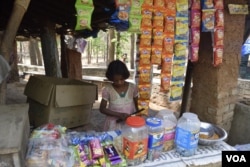Eighteen-year-old Jaya comes from the Munda tribe in India’s eastern state of Jharkhand. She has not seen her father in more than a decade. In 2013, Jaya’s mother — who works as a daily wage laborer in agricultural fields — took her two daughters and fled her marital home in Ranchi, the capital of the state, to settle down instead on land owned by her parents in their village, located in the interiors of Jharkhand.
“My father is an extreme alcoholic and used to get drunk and badly beat up my mother, my sister and me every single day when we lived with him,” Jaya, who asked that her real name not be used to protect her security, told VOA in a phone interview.
According to the fifth National Family Health Survey of India, more than 30% of Indian women belonging to scheduled tribes — tribal and indigenous communities recognized by the government — reportedly have faced physical domestic abuse.
Experts say the problem of domestic violence — physical, emotional, verbal and sexual — is exacerbated in tribal communities because of the deep-rooted culture of alcoholism in certain areas. Most cases go unreported.
Violence in every home
Rashmi Tiwary, founder of Aahan Foundation, a nongovernmental organization that works to prevent gender-based violence in Jharkhand’s tribes, told VOA that 100% of the girls she has worked with have faced or witnessed domestic violence of some kind.
“Domestic abuse has become a part of the tribal social fabric in Jharkhand, and a lot of it is connected to intergenerational alcohol addiction and inherited trauma. Despite being very strong physically, tribal women will often take extreme beatings simply because they think it is the men’s right to abuse them,” said Tiwary.
“Hadiya, an indigenous alcoholic drink prepared with fermented rice, was traditionally used as a coolant in Indian tribal communities. However, now it is produced in every other rural tribal home, using chemicals for quick fermentation and mass selling. For several such socioeconomically underprivileged families, selling Hadiya may be the only source of livelihood — and often seeps into their family’s culture as well,” she said.
Jaya, who resides with her grandparents, maternal uncles and their families, said that she “is not doing very well here, either.”
“My grandfather, who is an agricultural laborer, drinks often to blow off steam after work. But when he gets drunk, he beats up my mother and me very badly. Sometimes he even withholds food from us. No other family member tries to stop him, because this behavior is considered normal,” she told VOA.
Witch hunting
Rishi Kant, co-founder of Shakti Vahini, a New Delhi-based nongovernmental organization that works closely with several tribal communities, told VOA that domestic violence is “ingrained in the culture” of many tribes, and may not always look like what is conventionally understood as such.
“Superstitions prevail in Jharkhand’s tribes, and women and girls often face the brunt of it. A harrowing but common way in which domestic violence manifests in such cases is through witch hunting,” he said.
“If there is a problem in the family, like an illness or unemployment, a woman of the house is blamed — a daughter-in-law, a young girl, an elderly grandmother and so on. She is deemed as ‘possessed,’ beaten up, hung by the limbs from a tree with her body being mutilated,” Kant said.
In 2022, Jharkhand recorded 11 cases of witch hunting that ended in murder, according to the National Crime Records Bureau, or NCRB. Estimates suggest that between 60 to 70 women are killed for “practicing witchcraft” in Jharkhand every year, many of them belonging to indigenous tribes.
With both their parents often under the influence of alcohol, tribal children — especially girls — often become vulnerable to abuse, trauma and, in many cases, human trafficking.
Tiwary told VOA: “When tribal men become alcoholics, they get violent. But for women, Hadiya often leads them to withdraw from their family and neglect their children.
“There have been cases of young girls burning their hands while cooking because no adult in the house would prepare food. We have also encountered children who are beaten up by their mothers when drunk. Simultaneously, tribal girls take active part in preparing Hadiya and serving to customers — it is all a family business. In rare cases, the children partake in drinking, too,” she said.
Generational trauma
Clinical psychologist and trauma therapist Prachi Saxena Vaish said that witnessing regular domestic violence between parents can make a child especially vulnerable to abuse in future relationships.
“An experience of witnessing abusive relationships in early childhood can create a new normal for a child where they learn to associate ‘love’ with abuse. Even if they feel anger and rebellion toward what they are witnessing, they are unable to break away from this normalized abuse to create a healthy prototype of love in their minds,” she told VOA.
“Later, they may become easy victims of abuse in their own future relationships or adopt abusive behaviors themselves toward their partners because they believe that to be an expression of love,” she said.
Aahan Foundation founder Tiwary said that despite the high rates of violence in their families, tribal communities have little to no access to mental health resources.
“At Aahan, we offer free counselling, trauma therapy and dance therapy — all by licensed professionals — for tribal girls and boys. We also provide peer counseling, and with our main goal being to make the child feel loved, valued and protected through education, arts training and sports,” Tiwary said.
“However, Aahan has only reached the tip of the iceberg. We need support from the government and the global community — rehabilitation centers for tribal men and women struggling with alcohol addiction, improved mental health resources and awareness initiatives.”



